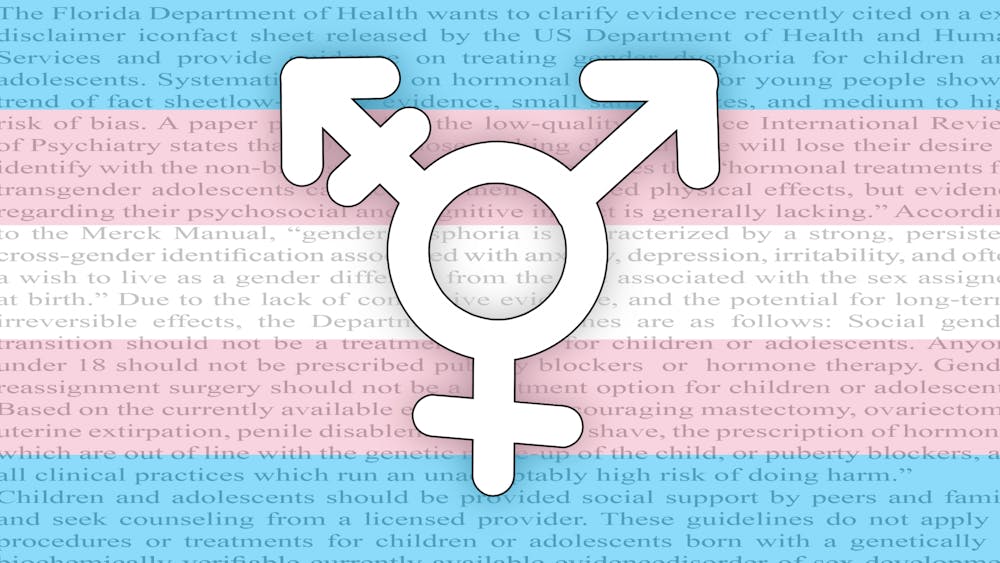The temporary blockage of a ban on Medicaid coverage for gender dysphoria treatments may be on the table in a Florida court this week.
The Agency for Health Care Administration’s ban on gender affirming care coverage went into effect Aug. 21, banning coverage for all treatments of gender dysphoria under the Florida Medicaid program.
These treatments include any procedures that alter primary or secondary sexual characteristics, according to the Florida adminstrative codes on general Medicaid policy.
Sept. 7, the Southern Legal Counsel and co-counsel filed a complaint against the AHCA and its secretary Simone Marstiller, initiating the process of a federal lawsuit. Sept. 12, they filed a motion for a preliminary injunction, which will see its first day in court Oct. 12.
The SLC’s co-counsel include Lambda Legal, the Florida Health Justice Project, the National Health Law Program and Pillsbury Winthrop Shaw Pittman.
The plaintiffs in the lawsuit are transgender Floridians August Dekker and Brit Rothstein. Two minors — a 12-year-old boy and a 12-year-old girl who are both transgender — are named as anonymous plaintiffs alongside their parents.
A 2015 survey on transgender individuals in the U.S. found about 82% of people reported seriously considering suicide, and around 40% reported attempting suicide, according to the University of California Los Angeles School of Law.
There are 100,300 transgender adults in Florida, according to a 2019 UCLA study.
In June, when the AHCA issued a notice to begin rule-making a Medicaid policy for gender dysphoria treatment, attorney and director of the transgender rights initiative at SLC Simone Chriss said she coordinated thousands of comments in opposition from impacted individuals and medical organizations.
“People are absolutely terrified,” Chriss said. ”I am not exaggerating when I say at least one parent each day asks me, ‘Should I leave this? Should I sell what I have? Should we sell our house, should we sell whatever we can to leave this state, so that I can protect my child from this?’”
The preliminary injunction asks the court to block enforcement of the AHCA’s Medicaid policy during the trial because litigating could take years, Chriss said.
“What we don't want is for people to be harmed every day that this rule is in effect, and for people to continue being denied care every day,” Chriss said.
If the ACHA is successful at the end of the trial, then its policy would remain in effect.
“Stripping those people of life saving medically necessary care that their doctors have determined is necessary for them is cruel and inhumane,” Chriss said.
Ahead of the court hearing, some Gainesville residents are fearful of the Medicaid policy's impact. One is JoJo Sacks, a specialist at the Santa Fe College LGBTQ Resource Center.
Sacks speaks with students who use gender affirming care such as therapy, hormone replacement therapy and surgery to help them feel more affirmed in their bodies. It’s an option many people look forward to having, Sacks said.
“People are afraid right now. I feel afraid as an educator who is queer,” Sacks said. “It's a hard time for all queer and trans folks. I think a lot of them do feel like they are under attack.”
The SLC is also monitoring the Florida Board of Medicine’s rule-making process for a standard of care for treating gender dysphoria in children and adolescents.
The Florida Board of Medicine is a separate entity from ACHA and hasn’t adopted a standard of care for transgender patients yet. It’s creating a standard of care and listening to the opinions of medical experts.
The adoption of a standard of care would prohibit doctors from providing any care that is deemed not the standard of care. Doctors risk losing their licenses if they violate these standards.
The Florida Board of Medicine and the Florida Board of Osteopathic Medicine were set to meet Sept. 30 for a rule-making workshop in Tallahassee, but the meeting was canceled.
Contact Melanie Peña at mpena@alligator.org Follow them on Twitter @MelanieBombino_.

Melanie Peña is a second-year business and journalism major. When she's not designing a graphic or writing an article, she's probably making jewelry or exploring coffee shops in Gainesville.






